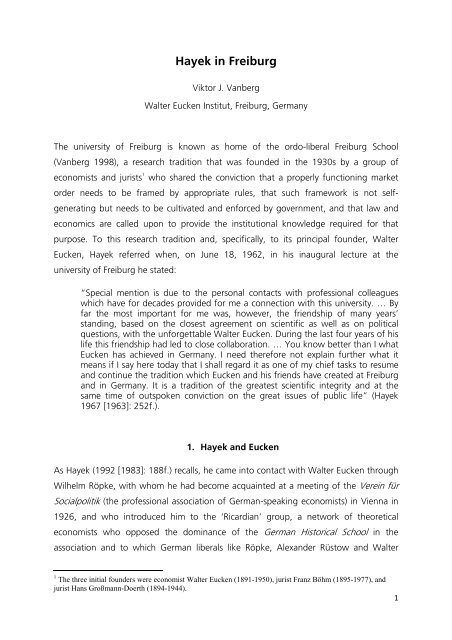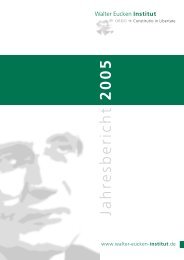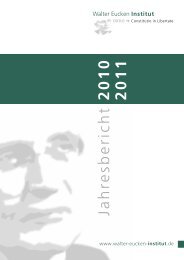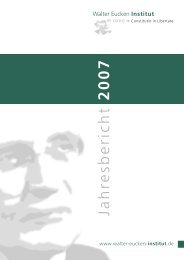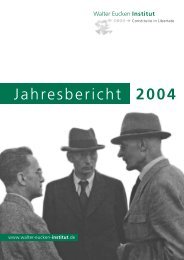Hayek in Freiburg - Walter Eucken Institut
Hayek in Freiburg - Walter Eucken Institut
Hayek in Freiburg - Walter Eucken Institut
Create successful ePaper yourself
Turn your PDF publications into a flip-book with our unique Google optimized e-Paper software.
<strong>Hayek</strong> <strong>in</strong> <strong>Freiburg</strong><br />
Viktor J. Vanberg<br />
<strong>Walter</strong> <strong>Eucken</strong> <strong>Institut</strong>, <strong>Freiburg</strong>, Germany<br />
The university of <strong>Freiburg</strong> is known as home of the ordo-liberal <strong>Freiburg</strong> School<br />
(Vanberg 1998), a research tradition that was founded <strong>in</strong> the 1930s by a group of<br />
economists and jurists 1<br />
who shared the conviction that a properly function<strong>in</strong>g market<br />
order needs to be framed by appropriate rules, that such framework is not self-<br />
generat<strong>in</strong>g but needs to be cultivated and enforced by government, and that law and<br />
economics are called upon to provide the <strong>in</strong>stitutional knowledge required for that<br />
purpose. To this research tradition and, specifically, to its pr<strong>in</strong>cipal founder, <strong>Walter</strong><br />
<strong>Eucken</strong>, <strong>Hayek</strong> referred when, on June 18, 1962, <strong>in</strong> his <strong>in</strong>augural lecture at the<br />
university of <strong>Freiburg</strong> he stated:<br />
“Special mention is due to the personal contacts with professional colleagues<br />
which have for decades provided for me a connection with this university. … By<br />
far the most important for me was, however, the friendship of many years’<br />
stand<strong>in</strong>g, based on the closest agreement on scientific as well as on political<br />
questions, with the unforgettable <strong>Walter</strong> <strong>Eucken</strong>. Dur<strong>in</strong>g the last four years of his<br />
life this friendship had led to close collaboration. … You know better than I what<br />
<strong>Eucken</strong> has achieved <strong>in</strong> Germany. I need therefore not expla<strong>in</strong> further what it<br />
means if I say here today that I shall regard it as one of my chief tasks to resume<br />
and cont<strong>in</strong>ue the tradition which <strong>Eucken</strong> and his friends have created at <strong>Freiburg</strong><br />
and <strong>in</strong> Germany. It is a tradition of the greatest scientific <strong>in</strong>tegrity and at the<br />
same time of outspoken conviction on the great issues of public life” (<strong>Hayek</strong><br />
1967 [1963]: 252f.).<br />
1. <strong>Hayek</strong> and <strong>Eucken</strong><br />
As <strong>Hayek</strong> (1992 [1983]: 188f.) recalls, he came <strong>in</strong>to contact with <strong>Walter</strong> <strong>Eucken</strong> through<br />
Wilhelm Röpke, with whom he had become acqua<strong>in</strong>ted at a meet<strong>in</strong>g of the Vere<strong>in</strong> für<br />
Socialpolitik (the professional association of German-speak<strong>in</strong>g economists) <strong>in</strong> Vienna <strong>in</strong><br />
1926, and who <strong>in</strong>troduced him to the ‘Ricardian’ group, a network of theoretical<br />
economists who opposed the dom<strong>in</strong>ance of the German Historical School <strong>in</strong> the<br />
association and to which German liberals like Röpke, Alexander Rüstow and <strong>Walter</strong><br />
1 The three <strong>in</strong>itial founders were economist <strong>Walter</strong> <strong>Eucken</strong> (1891-1950), jurist Franz Böhm (1895-1977), and<br />
jurist Hans Großmann-Doerth (1894-1944).<br />
1


